
Home for a time and life never seems to slow down. Brief trip to Colorado for a "family fix" now back to presentations and preparations for the future of KEC future on La Gonave.

 This little girl was born over three weeks ago to a young mother who labored the better part of two days with this first child. She had not eaten for a couple of days as she has no food or source of income. The father unknown to the family or community, I was told.
This little girl was born over three weeks ago to a young mother who labored the better part of two days with this first child. She had not eaten for a couple of days as she has no food or source of income. The father unknown to the family or community, I was told.



 A few years ago, Joe and I were in PaP for the celebration of Haitian Flag Day or the equivalent of our 4th of July. We went to the Palace and watched as what seemed like thousands of young people marched by in bright red and blue outfits. Most would stop at some point and do a very intricate about face routine then continue marching with drums and vocal cadence. We were very impressed with the color and pagentry of the event.
A few years ago, Joe and I were in PaP for the celebration of Haitian Flag Day or the equivalent of our 4th of July. We went to the Palace and watched as what seemed like thousands of young people marched by in bright red and blue outfits. Most would stop at some point and do a very intricate about face routine then continue marching with drums and vocal cadence. We were very impressed with the color and pagentry of the event.
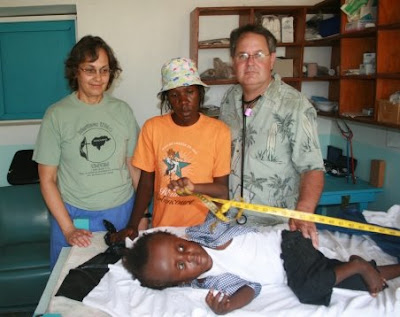
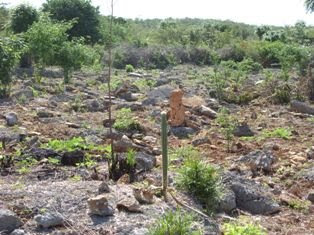 The photo is one of a garden / farm planted by a young man who has attended agronomy vocational school, sponsored by the Haitian Methodist Church. This is a typical garden on an island that is primarily mountains of coral rock and limestone. Crops are planted around and in between the rocks that can not be dug out.
The photo is one of a garden / farm planted by a young man who has attended agronomy vocational school, sponsored by the Haitian Methodist Church. This is a typical garden on an island that is primarily mountains of coral rock and limestone. Crops are planted around and in between the rocks that can not be dug out.

 Here is the church as it looked over a year ago. Before the storms. We didn't get photo's this year as we attended the Harvest Festival but the ceiling in still damaged from the storms and precarious for the many children who meet for school each day. Of course if the singing and preaching of Sunday didn't bring it down...probably nothing will!!
Here is the church as it looked over a year ago. Before the storms. We didn't get photo's this year as we attended the Harvest Festival but the ceiling in still damaged from the storms and precarious for the many children who meet for school each day. Of course if the singing and preaching of Sunday didn't bring it down...probably nothing will!! The Haitian Methodist Church offers a scholarship program but generally for children of ordained clergy..of which there are not very many. For most Haitian young people education beyond sixth grade is nearly impossible. Only about53 percent on the island of La Gonave even attend primary classes. This year the numbers are way down because money is so scarse following the storms of September.
The Haitian Methodist Church offers a scholarship program but generally for children of ordained clergy..of which there are not very many. For most Haitian young people education beyond sixth grade is nearly impossible. Only about53 percent on the island of La Gonave even attend primary classes. This year the numbers are way down because money is so scarse following the storms of September.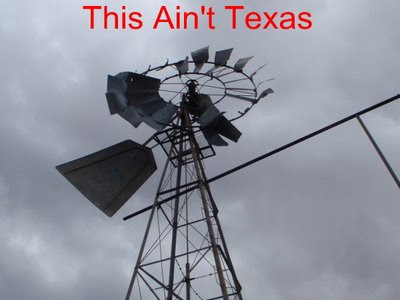

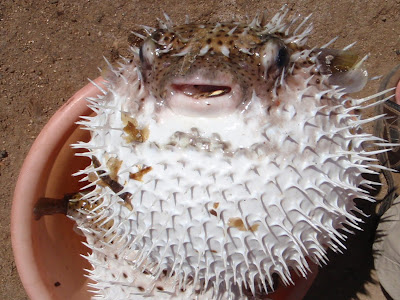
At long last the wind is down to a nice breeze. Some have even shed one layer of clothing!
Yesterday afternoon we wandered to the beach to see what was happening just as a fishing boat arrived with a rather strange variety of fish.
The fellow in the photo is a foo foo fish and someone bought both and said they are very good to eat. To me they seemed very large but apparently they get much bigger. Everyone was careful to stay away from the pointy things all over the body.
The rest of the "catch" was very impressive and much appreciated as many have not eaten much this week. People were purchasing anywhere from one to 10 fish of various sizes for very small amounts of money. Some tiny fish were sold by the pan full to be deep fried and eaten head, tail, insides and all!! I haven't mastered that yet.
It is still calm today with a balmy temp of about 91 degrees and light breeze. We will walk to Port a Bonheur after our breakfast of bread and lobster.
We are in search of a location for a clinic where we can provide nurses, doctor, lab, health education and local management. The clinic will be available to 10,000 plus people in more that 7-10 communities who now walk many miles for health care. Three have died because they could not reach a health facility in time.
Well, balmy days, foo foo fish and work to do on the second Sunday of Lent. Shirley
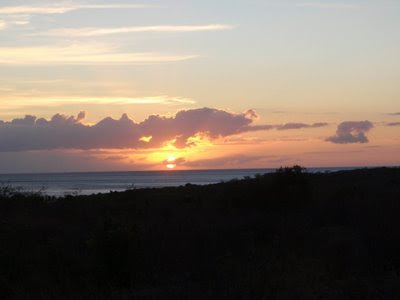 The wind is blowing as a hurricane without the rain and thunder stuff!
The wind is blowing as a hurricane without the rain and thunder stuff!
Villian, a skilled driver on La Gonave "non-road" roads only managed to get lost one time leaving Petion-Ville.When we arrived at the port it only cost $7.00 US to get the gate open to the place they would load the pickup. Villien negotiated the cost of port taxes down half, to $137.50 US and he had already arranged the boat for $385.00 US.
We had no idea how the pickup was going to get from the pier to the huge sailboat and watched in awe as it "happened." The nearly empty boat slowly came long side the dock which was significantly lower than the rear deck of the boat. Once the boat was securly tied to the dock they swung the giant mast over the side above the pier which tilted the boat level with the dock and a mariner drove the pickup onto the boat..with no room to spare!
 e loading dock where at least 100 tons of rice, beans, flour, and corn were loaded along with hundreds of bags of produce, soda pop, beer and oil. At least 50 large drums of gasoline was also put aboard before they loaded over 200 passengers. (Joe will not allow my normal hyperbole for this blog - and it isn't needed!) I was in shock as we loaded and every possible inch of the boat was covered before we pulled away from the dock.
e loading dock where at least 100 tons of rice, beans, flour, and corn were loaded along with hundreds of bags of produce, soda pop, beer and oil. At least 50 large drums of gasoline was also put aboard before they loaded over 200 passengers. (Joe will not allow my normal hyperbole for this blog - and it isn't needed!) I was in shock as we loaded and every possible inch of the boat was covered before we pulled away from the dock.



 This is the school director and teacher/preacher in Trou Jacques. This village is accessible by sea only unless one wishes to take a burro straight up the mountain four hours. The community is on the very east end of the island and sits in a triangle where the rain pours into the village and washes animals, children and homes into the sea frequently.
This is the school director and teacher/preacher in Trou Jacques. This village is accessible by sea only unless one wishes to take a burro straight up the mountain four hours. The community is on the very east end of the island and sits in a triangle where the rain pours into the village and washes animals, children and homes into the sea frequently.





 Well it has been a time of life and death in Sousafilip. We now have water as the generator has been fixed after a week of extreme conservation. It is a wonderful social time as people gather with every imaginable kind of container to receive the life giving water. I can't balance an empty bucket and walk two steps but the ladies lift the 6 gallons as if they weigh nothing and take off up the hill.
Well it has been a time of life and death in Sousafilip. We now have water as the generator has been fixed after a week of extreme conservation. It is a wonderful social time as people gather with every imaginable kind of container to receive the life giving water. I can't balance an empty bucket and walk two steps but the ladies lift the 6 gallons as if they weigh nothing and take off up the hill.